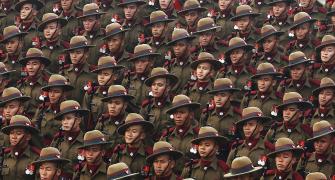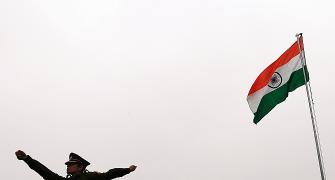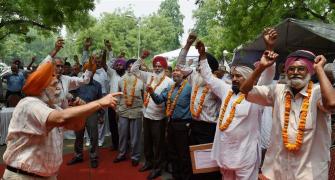Whilst politicians promise to uphold the honour and interests of our soldiers, the very opposite is being done, says Karan Thapar.

So much so that the army chief, who commands a force of over a million soldiers, is today considered junior to the attorney general! Photograph: Fayaz Kabli/Reuters
Politicians never lose an opportunity to praise our armed forces, none more so than the present prime minister, his Cabinet and party.
So you'd think the attention they pay to the welfare and status of our soldiers must be irreproachable.
One Rank One Pension suggests it is, but read on and discover the full truth.
The decision to ask the army to build three footover bridges in Mumbai is just the latest example of misuse.
Soldiers are not construction workers or odd job handymen to undertake difficult or urgent repairs.
Whilst no one would question using the army for civilian purposes in a genuine crisis, to ask them to undertake routine jobs which others could easily do is to abuse them.
It devalues their status, but also detracts from their training and focus on security.
Actually, the dismal truth is that whilst politicians promise to uphold the honour and interests of our soldiers, over the years they've steadily and deliberately done the opposite.
The misuse in Mumbai is part of a well-established pattern that has eroded the standing and remuneration of the armed forces. The examples I shall cite are from the army, but the experience of the navy and air force is no different.
Last year, the government decided to recalibrate the standing of critical army officers in comparison to their civilian counterparts.
Thus a brigadier, who was earlier equivalent to a principal director, was now equated to a director; a colonel, who was on par with a director, was lowered to the level of a joint director, whilst a lieutenant colonel, who was the same as a joint director, is now said to have no civilian equivalence.
The government claims 'there has been no downgrading or any change in the existing equivalence of the service ranks whatsoever', but that's not how it feels to the affected officers.
And the government has no answer that this recalibration is a breach of a 2009 decision by the United Progressive Alliance government.
The army accepted because it has grown used to being demoted in the official order of precedence created by the British in 1937. Its ranking has been systematically lowered since Independence.
| Who stands where | ||
| Rank | Then | Now |
|---|---|---|
| Brigadier | Principal director | Director |
| Colonel | Director | Joint Director |
| Lieutenant Colonel | Joint Director | No civilian equivalence |
As a result, the army chief, who commands a force of over a million soldiers, is today considered junior to the attorney general, the chief election commissioner, the comptroller and auditor general and the Union Public Service Commission chairman! Even ambassadors accredited to India take precedence!
More notoriously, a major general is equated with a joint secretary though it takes 30 years of service to reach the army rank, but only 18 to make it to the civilian post.
This is not just perceived as a slight but as a conscious attempt to keep soldiers in their place. That's an interpretation few in the army would quarrel with.
The army's remuneration is treated equally cavalierly. Last year, the government decided to change the method of calculating disability pensions to the slab formula from the earlier percentage-based calculation.
As a result, not only were army pensions reduced, but, additionally, a soldier disabled in battle ended up with a sizeably smaller disability than an equivalent rank civilian injured in a non-combat scenario.
Though, after vigorous protest, this iniquity was reversed the hurt it has caused will take longer to heal.
A more telling example of unequal monetary treatment is the refusal to extend the non-functional upgrade system to the armed forces though it was given to the civil services 10 years ago.
To compound matters, the 7th Pay Commission has created a separate pay matrix for the military and civilians which gives the latter 40 increments over 40 years but the former a number between 24 and 31, depending on the age of retirement.
The three services are convinced this unfair treatment is the work of civil servants who connive to do them down. Retired chiefs say so openly on television.
But this doesn't mean the military has exonerated politicians. They may not be so critical of them in public, but behind closed doors they are referred to as 'damned dhoti-kurtawallahs'.
And this gulf is one neither the Bharatiya Janata Party nor the Congress has attempted to address. Now their hypocritical rhetoric could exacerbate the distrust.










